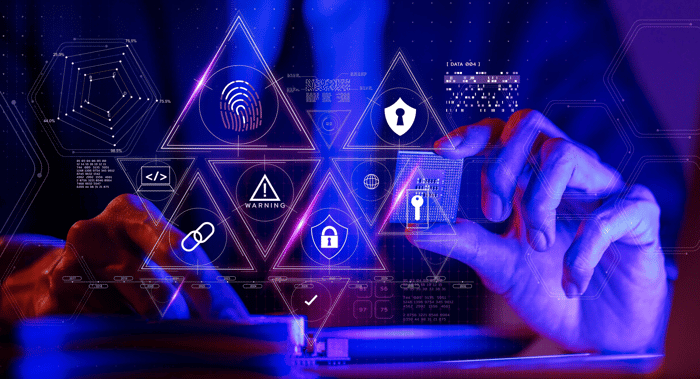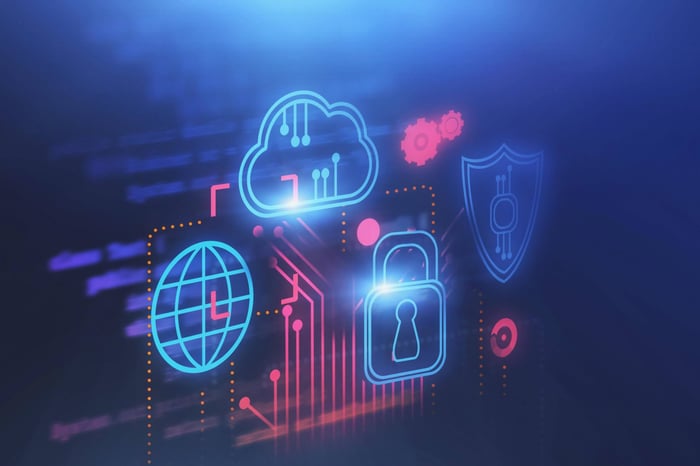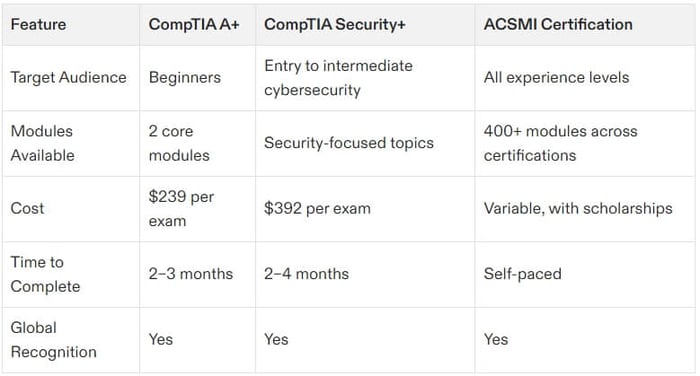Table of Contents
- Why Entry-Level Cybersecurity Certifications Matter
- 1. Stay Competitive in Cybersecurity
- 2. Career Growth Opportunities
- 3. Advanced Learning Pathways
- 4. Hands-On Skills with Real-World Applications
- 5. Recognition Globally
- Top Cybersecurity Certifications for Entry-Level Professionals
- What Makes a Great Cybersecurity Certification Entry Level?
- Final Thoughts
- FAQ – Everything You Need to Know About Entry-Level Cybersecurity Certifications
In today’s ever-evolving digital landscape, cybersecurity has emerged as one of the most critical fields. As businesses and organizations continue to shift operations online, the demand for cybersecurity professionals has skyrocketed. With this surge in demand, getting a Cybersecurity Certification Course Free is a great way to launch your career and stand out in a competitive job market.
Whether you’re looking to transition into a new field, add value to your existing IT expertise, or simply pursue a career in one of the most dynamic and fast-growing industries, entry-level cybersecurity certifications are your gateway to success. These certifications not only validate your technical knowledge but also give employers confidence in your ability to protect their digital infrastructure.
In this comprehensive guide, we’ll explore the top entry-level cybersecurity certifications, the benefits they offer, and how they can accelerate your career. From gaining hands-on experience to gaining global recognition, we’ll cover everything you need to know to start your career in cybersecurity.
Why Entry-Level Cybersecurity Certifications Matter
When starting a career in cybersecurity, certifications are one of the best ways to establish credibility and build foundational skills. But why exactly do they matter? Here’s a deeper look at the importance of earning an entry-level certification in cybersecurity:
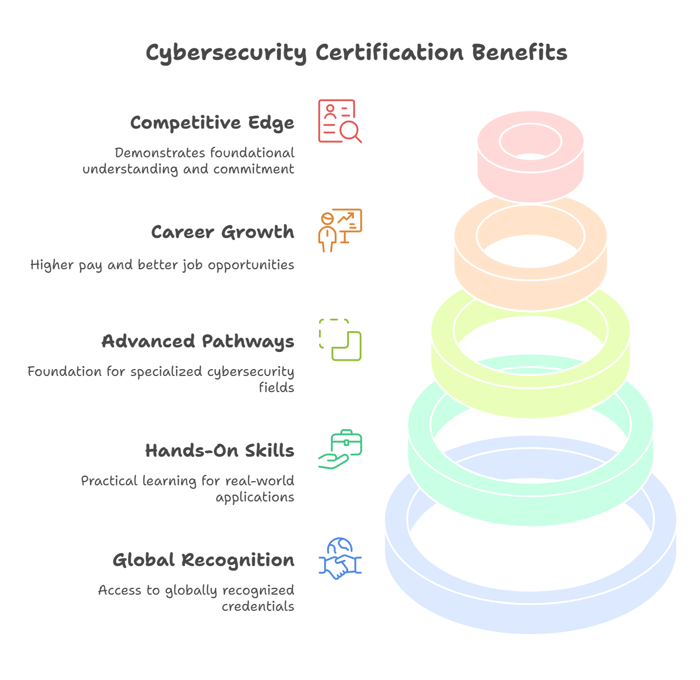
1. Stay Competitive in Cybersecurity
Cybersecurity is one of the most competitive fields, with increasing numbers of companies seeking professionals who can protect their digital assets from the growing number of cyberattacks. Earning a cybersecurity certification entry level demonstrates your foundational understanding of cybersecurity principles, helping you stand out to employers who want professionals who can start contributing immediately. Certifications equip you with the knowledge and skills necessary to work on real-world cybersecurity challenges, including preventing attacks, securing data, and ensuring systems are compliant with industry standards.
Moreover, a cybersecurity certification acts as proof that you are committed to the industry and have undergone formal training. This gives you a competitive edge in a field where continuous learning is crucial due to the constantly evolving threat landscape.
2. Career Growth Opportunities
The cybersecurity industry is expanding rapidly, with increasing demand for skilled professionals. This growth means that there are more career opportunities in the field, and entry-level certifications can help you tap into these roles. Positions such as Cloud Security Engineer, Security Analyst, and Incident Response Specialist are just some examples of entry-level roles in cybersecurity that often require or benefit from certifications.
Additionally, certified professionals are often compensated better than their non-certified peers. According to industry salary reports, certified individuals can earn 15-20% more than their uncertified counterparts. Furthermore, as you gain more experience, certifications open up opportunities for advanced roles and higher salaries, allowing you to scale your career over time.
3. Advanced Learning Pathways
Earning a cybersecurity certification entry level is often the first step in an ongoing journey of professional growth. Once you have completed the foundational certification, you can pursue more advanced certifications. This opens the door to specialization areas such as penetration testing, incident response, and security architecture. Certifications like the Certified Information Systems Security Professional (CISSP) and Certified Ethical Hacker (CEH) are great next steps after gaining some experience.
Moreover, some entry-level certifications also give you access to advanced AWS certifications, cloud security credentials, and other specialized programs that will allow you to develop expertise in niche areas of cybersecurity.
4. Hands-On Skills with Real-World Applications
One of the core aspects of cybersecurity is the ability to apply knowledge in real-world situations. Entry-level cybersecurity certifications offer practical, hands-on learning experiences that teach you how to identify vulnerabilities, respond to cyber incidents, and implement security protocols. The practical, interactive nature of many of these programs prepares you for the real-life challenges you will face when working in cybersecurity.
Courses often include labs, simulated attack scenarios, and incident management drills, ensuring that you can test your skills in a controlled, safe environment. By working through these exercises, you’ll gain experience that can be directly applied to job situations, making you more job-ready and valuable to employers.
5. Recognition Globally
When you earn a certification like CompTIA Security+ or Certified Cybersecurity Technician (CCT), you gain access to a globally recognized credential. Global recognition ensures that your certification will be seen as valuable by employers regardless of location. It increases the credibility of your skill set and demonstrates to employers that you have the qualifications needed to protect their infrastructure. Whether you’re applying for a local role or looking for international opportunities, global recognition gives you access to positions around the world, from the U.S. to Europe and Asia.
Top Cybersecurity Certifications for Entry-Level Professionals
As you begin your journey in the cybersecurity field, it’s important to choose the right certification. Here are some of the most highly regarded entry-level certifications that can help jumpstart your career, including How Much is Google Cybersecurity Certification, which many professionals consider when evaluating cost and value.
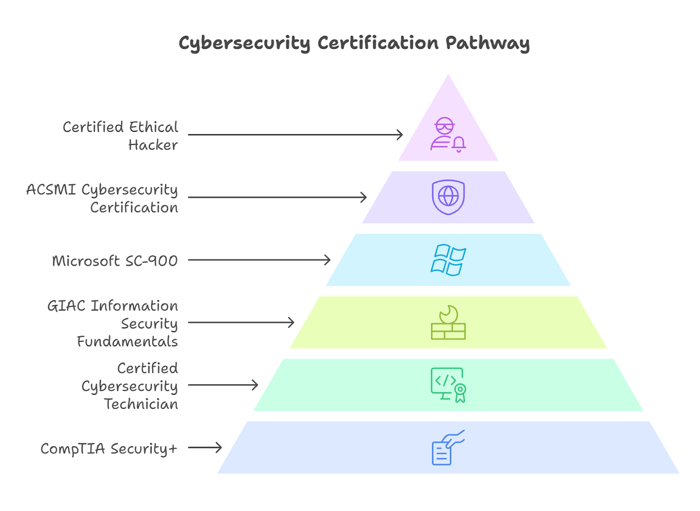
1. CompTIA Security+
Widely regarded as the ideal starting point for anyone entering cybersecurity, CompTIA Security+ provides a comprehensive overview of key cybersecurity concepts, including network security, incident management, and cryptography.
Why Get It?: It’s a vendor-neutral certification, meaning it’s not tied to a specific technology, making it versatile across various industries.
Who Should Pursue It?: Beginners entering the cybersecurity field or professionals looking to transition into cybersecurity roles.
2. Certified Cybersecurity Technician (CCT)
The Certified Cybersecurity Technician (CCT) program focuses on practical, hands-on skills needed to secure network defense systems and perform basic threat detection.
Why Get It?: This certification emphasizes practical skills over theoretical knowledge, making it ideal for those looking to quickly enter the workforce.
Who Should Pursue It?: Individuals interested in roles such as network administrator, security technician, or those looking for real-world, hands-on experience.
3. GIAC Information Security Fundamentals (GISF)
The GISF certification is designed for those looking to enter entry-level positions within the information security field. The certification covers security architectures, governance, and emerging technologies, with a focus on compliance.
Why Get It?: The GISF is ideal for those aiming for roles in compliance or governance within regulated industries such as finance and healthcare.
Who Should Pursue It?: Beginners with an interest in compliance, data governance, or security frameworks.
4. Microsoft SC-900 Security Certificate
The Microsoft SC-900 focuses on security, compliance, and identity concepts within Microsoft environments. It’s particularly useful for those who want to specialize in Microsoft’s cloud and enterprise systems.
Why Get It?: This certification is excellent for professionals looking to work in Microsoft-based environments or cloud platforms.
Who Should Pursue It?: IT admins, entrepreneurs, or anyone wanting to enter the cybersecurity field with a focus on Microsoft cloud technologies.
5. ACSMI Cybersecurity Entry-Level Certification
ACSMI’s multi-module entry-level certification is designed to give beginners a broader perspective on cybersecurity. It covers IoT device security, protection design, and various other aspects that are crucial for modern cybersecurity infrastructure.
Why Get It?: It provides depth in various cybersecurity domains and prepares candidates for a wide range of roles.
Who Should Pursue It?: Aspiring professionals, fresh graduates, and those looking for forward-thinking training.
6. Certified Ethical Hacker (CEH – Entry)
While traditionally an advanced certification, the CEH – Entry program introduces key ethical hacking concepts and prepares candidates for penetration testing roles.
Why Get It?: It sets the stage for specialized roles in penetration testing and ethical hacking.
Who Should Pursue It?: Career changers, technical candidates, or anyone interested in the ethical hacking field.
What Makes a Great Cybersecurity Certification Entry Level?
Choosing the right entry-level cybersecurity certification is essential for anyone looking to step into this rapidly growing field. The best certifications offer more than just basic knowledge—they provide a solid foundation for the future while aligning with your career goals. Here’s what to look for in a great entry-level cybersecurity certification:
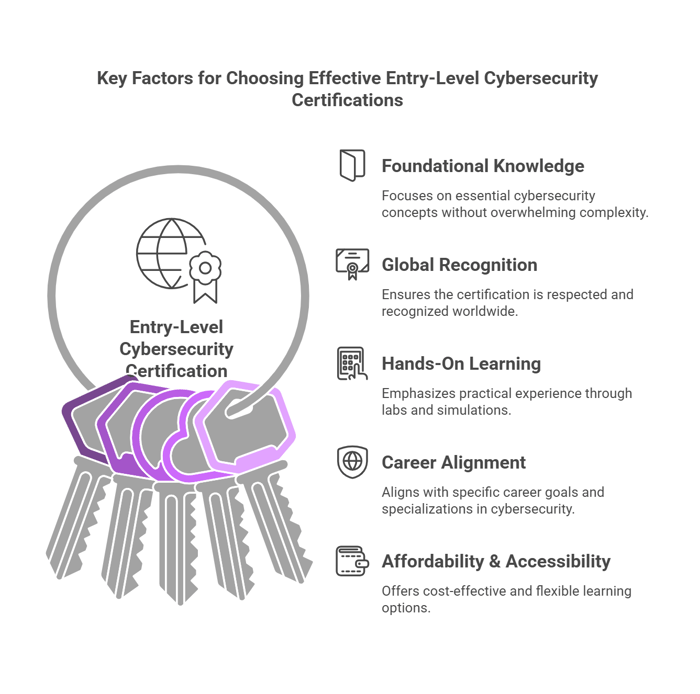
1. Foundational Knowledge Without Overkill
A good entry-level certification should focus on building foundational cybersecurity knowledge without overwhelming you with complexities. CompTIA Security+ is an example of a certification that gives you a broad understanding of key cybersecurity topics like network security and risk management, which are perfect for beginners.
2. Global Recognition
The certification should be recognized worldwide across various industries. CompTIA Security+, GIAC GISF, and CCT are certifications that are widely respected in the cybersecurity field and have been adopted by companies worldwide as standard qualifications for entry-level roles.
3. Hands-On Learning Experiences
Cybersecurity is a hands-on field that involves much more than theoretical knowledge. A good certification program should offer interactive labs, real-world simulations, and problem-solving scenarios. Cisco's CyberOps Associate or CCT provide the hands-on practice you need to understand real-world cybersecurity threats.
4. Alignment With Career Goals
Select a certification that aligns with your desired specialization. Whether you are interested in cloud security, penetration testing, or compliance, picking a certification that matches your interests will help you focus your learning and prepare for your desired role.
5. Affordability and Accessibility
Many entry-level certifications are affordable and offer flexible learning options, allowing you to study at your own pace. Certifications like CompTIA Security+ offer a reasonable cost and come with numerous resources to help you prepare.
6. Additional Perks and Opportunities
Look for certifications that offer extra benefits such as mentorship, job placement assistance, or networking opportunities with industry professionals. These added perks can help you fast-track your career and connect with others in the cybersecurity field.
Final Thoughts
Embarking on a cybersecurity career starts with selecting the right entry-level certification. Whether you choose CompTIA Security+, GIAC GISF, or ACSMI's 400+ module program, the certification you select will lay the foundation for a fulfilling and rewarding career in one of the world’s fastest-growing industries.
The demand for cybersecurity professionals is higher than ever, and entry-level certifications are the best way to jumpstart your journey. They not only provide essential knowledge but also demonstrate your commitment to safeguarding the digital world. With the right preparation and mindset, these certifications will open the doors to career advancement, job stability, and a competitive edge in the job market.
Take control of your future and start today. The world of cybersecurity needs skilled professionals like you!
FAQ – Everything You Need to Know About Entry-Level Cybersecurity Certifications
1. Which is the easiest cybersecurity certification entry level for beginners?
CompTIA Security+ is widely regarded as one of the most accessible certifications due to its vendor-neutral approach and straightforward exam structure.
2. How much does an entry-level cybersecurity certification cost?
Costs vary. For example, CompTIA Security+ ranges from $350-$400, while programs like ACSMI offer flexible pricing with potential scholarships.
3. Can I get into cybersecurity without a degree but with a certification?
Yes! Many entry-level roles in cybersecurity only require certifications, allowing you to bypass the degree requirements that many employers typically expect.
4. How long does it take to complete an entry-level certification?
The time to complete varies. Some certifications like Security+ can be completed in as few as three months, while ACSMI's program may take anywhere from 6–12 months depending on your study pace.
5. How do I prepare for the exam?
Use practice exams, official study resources, and hands-on labs. ACSMI’s virtual labs are an excellent way to simulate real-world scenarios.
6. Do certifications need to be renewed?
Yes, most certifications require renewal every 2–3 years to ensure that you stay updated on new technologies and threats in the cybersecurity field.



